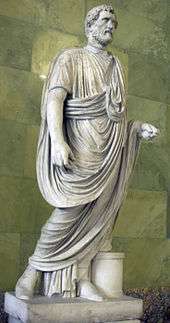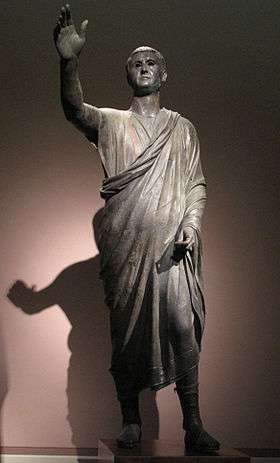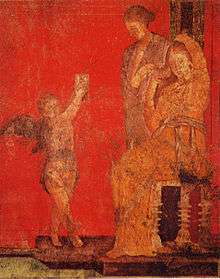Roman citizenship
Citizenship in ancient Rome (Latin: civitas) was a privileged political and legal status afforded to free individuals with respect to laws, property, and governance.
In the Roman Republic and later in the Roman Empire, people residing within the Roman state could roughly be divided into several classes:
- A male Roman citizen enjoyed a wide range of privileges and protections defined in detail by the Roman state. A citizen could, under certain exceptional circumstances, be deprived of his citizenship.
- Roman women had a limited form of citizenship. Though held in high regard they were not allowed to vote or stand for civil or public office. The rich might participate in public life by funding building projects or sponsoring religious ceremonies and other events. Women had the right to own property, to engage in business, and to obtain a divorce, but their legal rights varied over time. Marriages were an important form of political alliance during the Republic.
- Client state citizens and allies (socii) of Rome could receive a limited form of Roman citizenship such as the Latin Right. Such citizens could not vote or be elected in Roman elections.[2]
- Slaves were considered property and lacked legal personhood. Over time, they acquired a few protections under Roman law. Some slaves were freed by manumission for services rendered, or through a testamentary provision when their master died. Once free, they faced few barriers, beyond normal social snobbery, to participating in Roman society. The principle that a person could become a citizen by law rather than birth was enshrined in Roman mythology; when Romulus defeated the Sabines in battle, he promised the war captives that were in Rome they could become citizens.[3]
- Freedmen were former slaves who had gained their freedom. They were not automatically given citizenship and lacked some privileges such as running for executive magistracies. The children of freedmen and women were born as free citizens; for example, the father of the poet Horace was a freedman.
Rights
The rights available to individual citizens of Rome varied over time, according to their place of origin, and their service to the state. They also varied under Roman law according to the classification of the individual within the state. Various legal classes were defined by the various combinations of legal rights that each class enjoyed. However, the possible rights available to citizens with whom Roman law addressed were:

- Ius suffragiorum: The right to vote in the Roman assemblies.
- Ius honorum: The right to stand for civil or public office.
- Ius commercii: The right to make legal contracts and to hold property as a Roman citizen.
- Ius gentium: The legal recognition, developed in the 3rd century BC, of the growing international scope of Roman affairs, and the need for Roman law to deal with situations between Roman citizens and foreign persons. The ius gentium was therefore a Roman legal codification of the widely accepted international law of the time, and was based on the highly developed commercial law of the Greek city-states and of other maritime powers.[4] The rights afforded by the ius gentium were considered to be held by all persons; it is thus a concept of human rights rather than rights attached to citizenship.
- Ius conubii: The right to have a lawful marriage with a Roman citizen according to Roman principles,[5] to have the legal rights of the paterfamilias over the family, and for the children of any such marriage to be counted as Roman citizens.
- Ius migrationis: The right to preserve one's level of citizenship upon relocation to a polis of comparable status. For example, members of the cives Romani (see below) maintained their full civitas when they migrated to a Roman colony with full rights under the law: a colonia civium Romanorum. Latins also had this right, and maintained their ius Latii if they relocated to a different Latin state or Latin colony (Latina colonia). This right did not preserve one's level of citizenship should one relocate to a colony of lesser legal status; full Roman citizens relocating to a Latina colonia were reduced to the level of the ius Latii, and such a migration and reduction in status had to be a voluntary act.
- The right of immunity from some taxes and other legal obligations, especially local rules and regulations.[6]
- The right to sue in the courts and the right to be sued.
- The right to have a legal trial (to appear before a proper court and to defend oneself).
- The right to appeal from the decisions of magistrates and to appeal the lower court decisions.
- Following the early 2nd-century BC Porcian Laws, a Roman citizen could not be tortured or whipped and could commute sentences of death to voluntary exile, unless he was found guilty of treason.
- If accused of treason, a Roman citizen had the right to be tried in Rome, and even if sentenced to death, no Roman citizen could be sentenced to die on the cross.
Roman citizenship was required in order to enlist in the Roman legions, but this was sometimes ignored. Citizen soldiers could be beaten by the centurions and senior officers for reasons related to discipline. Non-citizens joined the Auxilia and gained citizenship through service.
Classes of citizenship
The legal classes varied over time, however the following classes of legal status existed at various times within the Roman state:

Cives Romani
The Cives Romani were full Roman citizens, who enjoyed full legal protection under Roman law. Cives Romani were sub-divided into two classes:
- The non optimo iure who held the ius commercii and ius conubii (rights of property and marriage)
- The optimo iure, who also held these rights as well as the ius suffragiorum and ius honorum (the additional rights to vote and to hold office).
Latini
The Latini were a class of citizens who held the Latin Rights (ius Latii), or the rights of ius commercii and ius migrationis, but not the ius connubii. The term Latini originally referred to the Latins, citizens of the Latin League who came under Roman control at the close of the Latin War, but eventually became a legal description rather than a national or ethnic one. Freedmen slaves, those of the Cives Romani convicted of crimes, or citizens settling Latin colonies could be given this status under the law.
Socii
Socii or Foederati were citizens of states which had treaty obligations with Rome, under which typically certain legal rights of the state's citizens under Roman law were exchanged for agreed levels of military service, i.e. the Roman magistrates had the right to levy soldiers for the Roman legions from those states. However, Foederati states that had at one time been conquered by Rome were exempt from payment of tribute to Rome due to their treaty status.
Growing dissatisfaction with the rights afforded to the Socii, and with the growing manpower demands of the legions (due to the protracted Jugurthine War and the Cimbrian War) led eventually to the Social War of 91–88 BC in which the Italian allies revolted against Rome.
The Lex Julia (in full the Lex Iulia de Civitate Latinis Danda), passed in 90 BC, granted the rights of the cives Romani to all Latini and socii states that had not participated in the Social War, or who were willing to cease hostilities immediately. This was extended to all the Italian socii states when the war ended (except for Gallia Cisalpina), effectively eliminating socii and Latini as legal and citizenship definitions.
Provinciales
Provinciales were those people who fell under Roman influence, or control, but who lacked even the rights of the Foederati, essentially having only the rights of the ius gentium.
Peregrini
A Peregrinus (plural Peregrini) was originally any person who was not a full Roman citizen, that is someone who was not a member of the Cives Romani. With the expansion of Roman law to include more gradations of legal status, this term became less used, but the term peregrini included those of the latini, socii, and provinciales, as well as those subjects of foreign states.
Citizenship as a tool of Romanization

Roman citizenship was also used as a tool of foreign policy and control. Colonies and political allies would be granted a "minor" form of Roman citizenship, there being several graduated levels of citizenship and legal rights (the Latin Right was one of them). The promise of improved status within the Roman "sphere of influence", and the rivalry with one's neighbours for status, kept the focus of many of Rome's neighbours and allies centered on the status quo of Roman culture, rather than trying to subvert or overthrow Rome's influence.
The granting of citizenship to allies and the conquered was a vital step in the process of Romanization. This step was one of the most effective political tools and (at that point in history) original political ideas (perhaps one of the most important reasons for the success of Rome).
Previously Alexander the Great had tried to "mingle" his Greeks with the Persians, Egyptians, Syrians, etc. in order to assimilate the people of the conquered Persian Empire, but after his death this policy was largely ignored by his successors. The idea was to not do this assimilate but to turn a defeated and potentially rebellious enemy (or his sons) into a Roman citizen. Instead of having to wait for the unavoidable revolt of a conquered people (a tribe or a city-state) like Sparta and the conquered Helots, Rome tried to make those under its rule feel that they had a stake in the system.
The Edict of Caracalla
The Edict of Caracalla (officially the Constitutio Antoniniana (Latin: "Constitution [or Edict] of Antoninus") was an edict issued in AD 212 by the Roman Emperor Caracalla, which declared that all free men in the Roman Empire were to be given full Roman citizenship and all free women in the Empire were given the same rights as Roman women. Before 212, for the most part only inhabitants of Italia held full Roman citizenship. Colonies of Romans established in other provinces, Romans (or their descendants) living in provinces, the inhabitants of various cities throughout the Empire, and a few local nobles (such as kings of client countries) also held full citizenship. Provincials, on the other hand, were usually non-citizens, although some held the Latin Right.
See also
References
- 1 2 Goodfellow, Charlotte Elizabeth (1938). Roman citizenship: a study of its territorial and numerical expansion from the earliest time to the death of Augustus. The Johns Hopkins University press.
- ↑ Hans Volkmann: Municipium. In: Der Kleine Pauly. vol. 3, Stuttgart 1969, col. 1464–1469.
- ↑ Plutarch, Life of Romulus 16.4.
- ↑ "Roman Law". The Columbia Encyclopedia, Sixth Edition. New York: Columbia University Press. Retrieved 2007-07-28.
- ↑ conubium. Charlton T. Lewis and Charles Short. A Latin Dictionary on Perseus Project.
- ↑ Catholic Resources
External links
- Goldsworthy, Adrian (2003-10-27). The Complete Roman Army. Thames & Hudson. p. 224. ISBN 0-500-05124-0.
- Jahnige, Joan (May 2002). "Roman Citizenship". Kentucky Educational Television Distance Learning. Retrieved 2008-09-06.
- Lassard, Yves; Alexandr Koptev. "The Roman Law Library" (Library). Retrieved 2008-09-06.
- Just, Felix. "Social Aspects of Pauline World". Catholic Resources for Bible, Liturgy, Art, and Theology. Retrieved 2008-09-06.